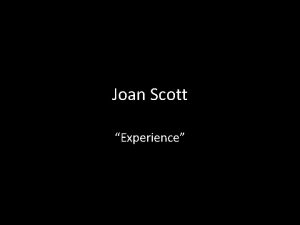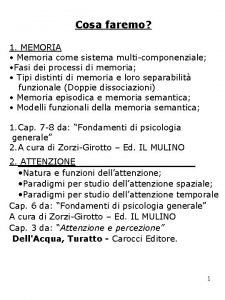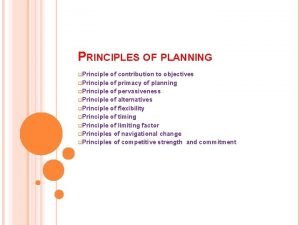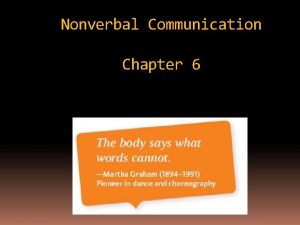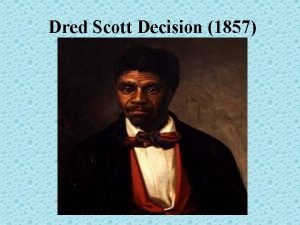Joan Scott Experience Primacy of vision The privileging








- Slides: 8

Joan Scott “Experience”

Primacy of vision • The privileging of vision as source of knowledge • Writing is in the service of vision • Enlarging or completing the picture; making the invisible; illuminating the lives of others

Evidence of experience • Referential notion of evidence—reflection of the real • Experience as uncontestable evidence—evidence for the fact of difference • Originary point of explanation • Foundation on which analysis is based • Identity taken as self-evident • Meaning as transparent • Agency reified and decontextualised

Historicising experience • --stemmed from a critique of empiricism • --precludes analysis of the ideological system; reproduces its terms • --ignores that difference is constituted relationally • --historical processes position subjects and produce their experiences (p. 25) • --subjects are constituted through experience • --experience: that which we seek to explain, about which knowledge is produced (p. 26)

Experience as a foundational trope • Takes people as already constituted; naturalises categories • --subjects seen as fixed and autonomous; • --reliable sources—access the real by means of experience

Between social structure and social consciousness (E P Thompson) • Experience as social being—the lived realities of social life, incl the affective domains of family, religion and the symbolic domain of expression • --escape from strong structural determination, via feeling, agency, defies prediction • --relations of production are the common denominator, a unifying phenomenon: a common identity of class (that pre-exists politics) • --other subject positions subsumed: gender, race, sexuality

A critique • Contradictory and contested processes of identity formation • No smooth translation from the personal to the political (lived experience of women does not necessarily lead to feminist consciousness) • Politics is about organising and interpreting experience • Experience is necessarily discursive (not outside signification and discourse) • Identity not simply found

Critique, contd. Processes of identity production Discursive nature of experience Politics of constructing experience Experience is both an interpretation and in need of interpretation • Experience is not the origin of explanation but that which we want to explain • •
